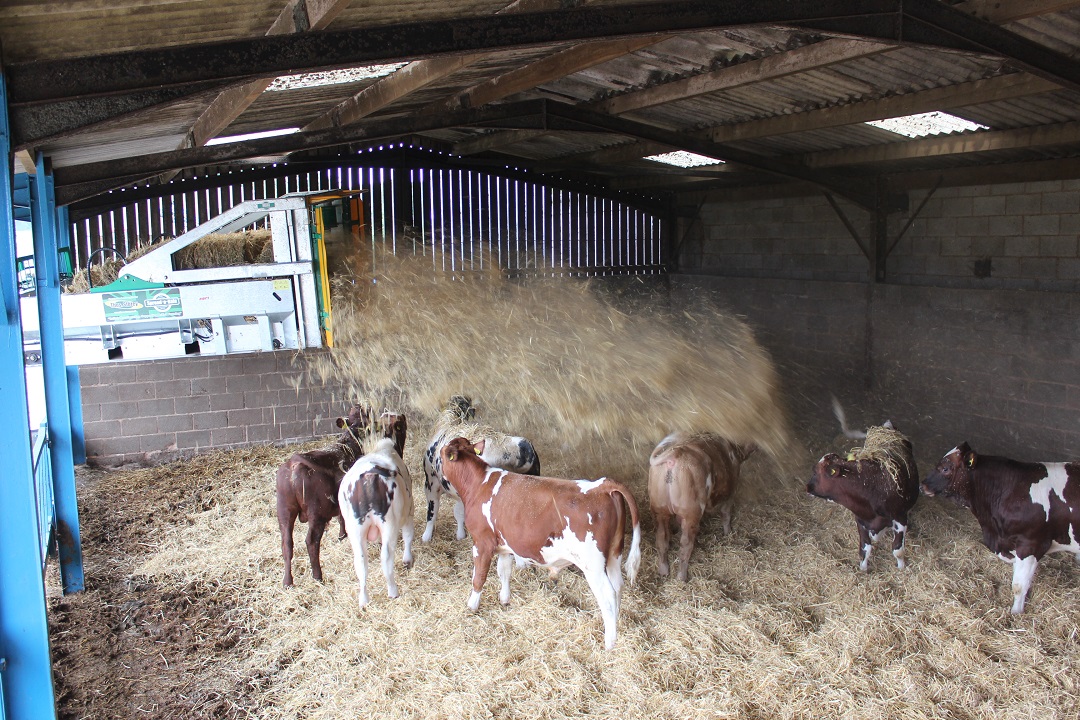
Better Beds & Herd Health
09/09/2015
“Well bedded; half fed†is an old farming adage that Andrew Hall is happy to quote in relation to his decision to switch to mechanised spreading of bedding straw for the Dudley Wood Ayrshire herd.
As well as ensuring these top quality animals have top quality beds on which to lie, the move is also reducing the time taken to bed down the herd and cutting their straw bill, he says.
Andrew runs the herd at Dudley Wood Farm, Bentley, near Atherstone, in partnership with his parents Graham and Jennifer, who founded it in 1982 and had gradually built up the farm via tenancies and land purchases.
The 140-strong herd – the only Ayrshire herd left in Warwickshire - has just won Warwickshire National Milk Records’ ‘Healthy Herd’ competition for the third year in a row.
They buy in straw because – besides a small acreage of forage maize – all their land is down to clover-rich leys that supply summer grazing and the grass silage that forms the basis of their winter diets.
Cattle can be housed for six months each year, so straw costs are significant. They switched to mechanical spreading of bedding straw when their straw supplier changed his operations:
“When our main supplier was providing round bales we could drop them in the yards and spread them by rolling them around and forking the straw out.
“But that was not an option when he switched to square Hesston bales, which was when we looked for an alternative method and chose the Spread-a-Baleâ€.
Switching to mechanical spreading has reduced straw usage, he says: “We used to buy about 400 acres worth of straw each winter and we have been able to reduce that by about 50 acres, so there has been an immediate financial benefit.
“It used to take us an hour and a half to bed down all the pens. Now it takes just half an hour and I don’t think we could do it without the Spread-a-Bale. If it every broke down we’d be in a real messâ€.
Their
main milking herd overwinters in two main buildings, with other stock wintering
in smaller pens. They spread the straw by driving the loader into the pen while
cows are waiting to be milked and spreading straw behind them as the leave.
Cows calve all year round, with their best cows being inseminated to Ayrshire bulls, with the aim being to breed robust, mobile replacements that don’t suffer health and fertility problems and sustain healthy milk production from forage.
Lower quality cows are inseminated to continental beef breeds with all progeny being finished for beef, and they use a Sussex bull to serve heifers.
Bull calves are finished entire and sold deadweight at 16 months to Foyle Meats, and the Spread-a-Bale has made bedding them down both easier and safer:
“We can have 80 bull beef on the farm at any one time and they are housed all year round. We bed them down every few days. We used to just push the bales into their pens and let them spread the straw around themselves which wasn’t terribly efficient.
“With the Spread-a-Bale we can do the job properly without anyone having to enter the pen, which is easier, safer and means they have a proper bed tooâ€.